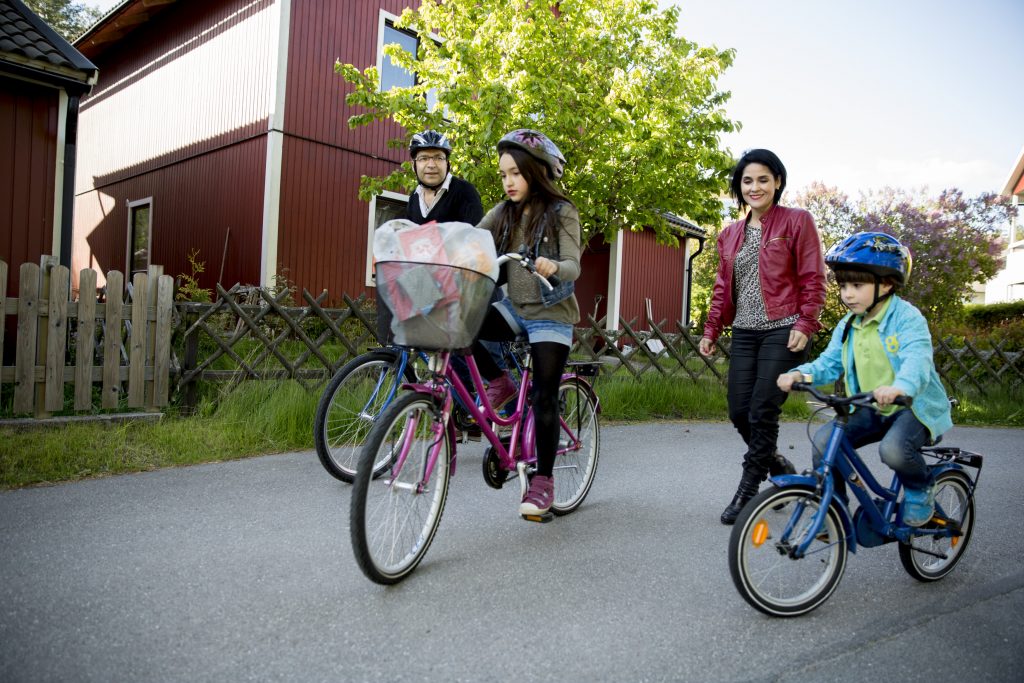What do you usually, often, never do in Swedish? Posted by Chelsea B on Nov 19, 2019 in Grammar, Swedish Language, Vocabulary
Last week’s blog post was all about how helping verbs describe what we “can, need, must, may” do. In this post, we’ll discuss the Swedish word brukar, or “usually”, which also functions as a helping verb. This verb comes in handy when talking about your daily routine, what you usually do in your free time, and more! We’ll even cover another way to modify sentences by using frequency adverbs, like often, always, sometimes, and never.
First, to work with brukar, we need to remember to put our main verb in the infinitive form. If you need a reminder of how that works, check out my last post here where I break down that subject and provide you with a few examples:
Eva brukar vakna tidigt. Eva usually wakes up early.
Hunden brukar gå ut tre gånger om dagen.
The dog usually goes out three times a day.
Familjen brukar cykla tillsammans på helgerna.
The family bikes together on the weekends.
You can also use brukar in question format with words like vad, när… ?
-Vad brukar du göra på fritiden? -What do you usually do in your free time?
-Jag brukar träffa vänner på fritiden. -I usually meet friends in my free time.
-När brukar du gå på gymmet? –When do you usually go to the gym?
-Jag brukar gå på gymmet efter jobbet. -I usually go to the gym after work.
Brukar is good for comparisons as well. As in, “Do you usually do this or that?”
Brukar hon åka tåg eller buss till mataffären?
Does she usually take the train or bus to the grocery store?
Brukar du äta lunch vid datorn eller vid lunchbordet?
Do you usually eat lunch at the computer or the lunch table?
Helping verbs can also be conjugated into the past tense. For example, brukade is the equivalent of “used to” in English, when used with an action verb:
brukar -> brukade usually – > used to
De brukade cykla till stationen varje dag.
They used to bike to the station every day.
Jag brukade sova med lampan tänd när jag var liten.
I used to sleep with the light on when I was little.
In addition to describing what you usually do, how about things you never, sometimes, always do? Frekvensadverb or frequency adverbs, are great in expressing this notion! Here are the most common ones:
alltid always
Det är svårt alltid för mig att vakna tidigt.
It is always difficult for me to wake up early.
ofta often
-Går du ofta på teater? -Do you go to the theater often?
-Nej, jag går inte så ofta på teater. -No, I don’t go to the theater often.
sällan seldom, rarely
Vi ser sällan varandra.
We rarely see each other.
aldrig never
Varför spelar du aldrig bingo med oss?
Why do you never play bingo with us?
You’ll notice that these adverbs function similarly to inte, in that they follow the main verb in sentence structure. However, the next adverb, ibland, is special and wants to be treated as such. It goes either first or last in a Swedish sentence:
ibland sometimes
Ibland diskuterar vi politik på jobbet. Sometimes we discuss politics at work.
Jag känner mig så trött ibland. I feel so tired sometimes.
Now, if you want to earn bonus points from this grammar lesson, you can add these two concepts together, with brukar AND and a frequency adverb:
Vi brukade alltid åka till sommarstugan i juli.
We used to always go to the cabin in July.
Lärarna brukar aldrig tillåta elever att äta i klassrummet.
The teachers usually never allow students to eat in the classroom.
This sentence structure is pretty basic, focusing on the use of these words in a main clause. To learn about word order in subordinate clauses, check out this blog post.
Now it’s your turn! A great way to practice this concept is to write about your weekly routine. Vad brukar du göra på måndag? Vad brukar du göra på fredagskvällar?

Build vocabulary, practice pronunciation, and more with Transparent Language Online. Available anytime, anywhere, on any device.





Comments:
Anneli:
Rättelse: Det är alltid svårt för mig att vakna tidigt.
Chelsea B:
@Anneli Tack Anneli! Du har rätt 🙂
Ahmed:
@Chelsea B I want to learn swedish language .. i’m 46 years old from egypt and i planning to investigate at sweden
Sofia:
Hi, nice post, however, there are a few mistakes in my opinion, as follows:
”Familjen brukar cyklar tillsammans på helgerna” should say “Familjen brukar cykla tillsammans på helgerna”.
”Jag brukar på gymmet efter jobbet” – there’s “gå” missing so it should be “Jag brukar gå på gymmet efter jobbet”.
”Det är alltid för mig svårt att vakna tidigt” here I suggest using a different word order so it sounds more natural: “Det är alltid svårt för mig att vakna tidigt”.
I’m not a native speaker, I just love the language and your posts are a great way how to keep practising this beautiful language. Keep it up:)!
Chelsea B:
@Sofia Du har rätt, Sofia! Tack för hjälpen 🙂
Yana:
Thank you a lot! It is great to see here posts again, I hope you won’t stop posting 🙂
Chelsea B:
@Yana I’ll be posting every Tuesday! Let me know if there is anything you would like to see here!